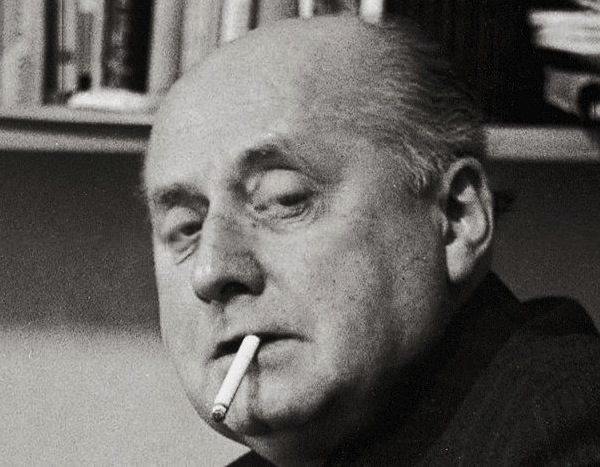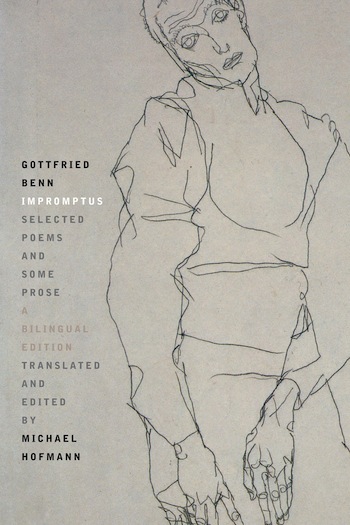Poetry Review: The Unexpected Compassion of German Poet Gottfried Benn
A collection of poems and essays, edited and translated by the award-winning poet Michael Hofmann, by the admired German poet Gottfried Benn, who, because of his brief association with Nazism, has been absent from our mainstream, non-specialized, English-language view of modern German poetry.
Impromptus: Selected Poems and Some Prose, by Gottfried Benn, translated from the German by Michael Hofmann, Farrar, Straus & Giroux, 372 pp., $30.
By John Taylor
Discovering Gottfried Benn (1886-1956), especially outside of Germany, has long had its obstacles. At the origin of all of them is that the expressionist poet, who was a medical doctor by profession, is associated with Nazism. As opposed to contemporaries such as Bertolt Brecht (1898-1956) or Thomas Mann (1875-1955)—two characteristic literary figures from the period—Benn remained in Germany during the Second World War and was involved with the Nazis for about two years.
As the British poet Michael Hofmann explains in Impromptus, his generous bilingual selection of Benn’s verse—and twelve significant prose texts are included as well—the poet initially thought that “his Nietzschean and Spenglerian gloom had somewhere to dock” in 1933. “He drafted a declaration of loyalty,” continues Hofmann, “to the newly returned Nazi government [. . .], addressed a sharp ‘reply to the literary émigrés,’ [. . .] gave a talk welcoming the Italian futurist (and Fascist) poet Filippo Marinetti to Berlin, [and] was briefly vice president of Hitler’s [. . .] Union of National Writers.”
But it soon “dawned on Benn,” adds Hofmann, “that the Nazis were not a bunch of pessimistic aesthetes like himself, but rather imbued with a sanguinary optimism; by the time of the Night of the Long Knives in June 1934 he was fully disabused.” The Nazis subsequently made life difficult for the poet, getting him removed from the medical register (because of his earlier Jewish associations and because his name suggested the Jewish name Ben!) and banning him from writing altogether in 1938.
As a doctor, Benn nonetheless managed to join the German army, an act that he described as “the aristocratic form of emigration.” Having worked as a doctor in a whorehouse in Brussels during the First World War, he now found himself assigned to study suicide, among the military, in the Second. Needless to say, these two unusual occupations inform Benn’s especial combination of compassion and lucid cynicism, especially in the verse penned amid postwar “devastations.” Tellingly, in the same-titled poem, he points to something ultimately life-affirming: “but where there’s nothing more to devastate, / even the ruins are mellowing, / chicory and plantain sprouting / from tumps of rubble / smooshed to humus.” These changes in perspective often surprise the reader.
So Benn’s postwar reputation and “reception” rather resembles that of the philosopher Martin Heidegger (1889-1976), who likewise adhered to Nazi ideology for a short period of time and who, like the poet, never explained why, let alone repented, after the war. By the way, Heidegger and his notion of “Geworfenheit” (the state of “being-thrown-into”) are parodied in a stanza from “Little Cultural Commentary”:
And if you’re given to talking about existential angst
some Midgard snake for breakfast,
the illimitable Oceanos in the evening,
and at night the being-thrown-into—then you’ll sleep soundly—
the West no longer wants to defend itself—
it wants to be scared, it wants that thrown feeling.
How to appraise, then, Benn’s short-lived allegiance to Nazism in regard to the acceptability of his literary oeuvre? “It remains an anomalous and troubling interval in [Benn’s] life,” concludes Hofmann, “before, so to speak, normal disservice was resumed; to use it as grounds for not reading Benn—to play the “Fascist card”—is merely lazy and a little hysterical.” In Germany, he did win the Georg Büchner Prize as early as 1951 and a Collected Poems was issued five years later, but, despite his albeit somewhat equally disturbing fame in his homeland, he has nonetheless remained absent from our mainstream, non-specialized, English-language view of modern German poetry, dominated by the figure of Brecht.
Hofmann’s point is well taken. To be sure, other poets and writers much more deeply, extensively, and actively linked to Nazism and/or Fascism, such as the American poet Ezra Pound, the French novelist Louis-Ferdinand Céline, the Romanian francophone aphorist Emil Cioran, or the Norwegian writer Knut Hamsun, have suffered much less than Benn from persistent critical and editorial rejection in postwar European literary history. Moreover, Hofmann also rightly points out that “we’re talking of someone of the eminence of, say, Wallace Stevens, someone most Germans (and most German poets too) would concede as the greatest German poet since Rilke.” The absolute superlative is unnecessary here, but Benn is certainly one of the twentieth-century German poets whose oeuvres should be attentively studied.
In contrast to Brecht, Hofmann’s selection—the first major one in English, because E. B. Ashton mostly translates prose in Primal Vision (New Directions, 1958)—amply shows how different a poet Benn is. Whereas Brecht’s verse is often succinct, paradoxical, simple in diction, with an emphasis on political and social satire, Benn’s sometimes equally satirical—or rather, sardonic—poetry has a much richer lexical texture and more original syntactic structures. The Wallace Stevens analogy can be pursued further because of their converging poetics. The two men share a liking for cognitive leaps and for sharp imagery with a cultural sting to it. Might not the following lines be called “inverted Stevensian”?
There were no Gainsboroughs in my parents’ house
and no one played Chopin
perfectly philistrous intellectual life
my father had been to the theatre once
in the early century
Wildenbruch’s “Crested Lark”
that was our pabulum
there was nothing else.
Hofmann makes another perceptive point when he observes that Benn “is both the hardest and the softest poet who ever lived.” Benn’s expressionist propensities can be harshly graphic, as in this early poem, “Little Aster,” from the 1912-1920 period:
A drowned drayman was hoisted onto the slab.
Someone had jammed a lavender aster
between his teeth.
As I made the incision up from the chest
with the long blade
under the skin
to cut out tongue and palate,
I must have nudged it because it slipped
into the brain laying adjacent.
I packed it into the thoracic cavity
with the excelsior
when he was sewn up.
Drink your fill in your vase!
Rest easy,
little aster!
But even here, “softness” is perceptible in the final distich. The German distich, “Ruhe sanft / kleine Aster!,” opens with two particularly gentle words, suitable for a lullaby or a reassuring remark to a friend; one even hears a distant echo of the noun “Ruh” (peace) of one of Goethe’s most famous poems, “Über allen Gipfeln / ist Ruh” (“Over all the peaks / Is peace”). Irony also functions here, assuredly, making this concluding emotion more multifaceted or intricate than it might at first seem. It is not because they are difficult to understand but rather because of this emotional complexity that so many of these poems bear rereading and re-pondering.

Gottfried Benn — he is certainly one of the twentieth-century German poets whose oeuvres should be attentively studied.
In Benn’s postwar writing, such effects occur even more often. “No Tears” is representative of the kind of unexpected swells of emotion that can crop up in his verse, especially at the end of poems. Here are the final four stanzas:
What good is the luster conferred by European pundits,
the great name,
the pour le mérite,
people who shoot their cuffs and tool on,
it’s only the ephemeral that’s beautiful,
looking back, the poverty,
the frowstiness that didn’t know what it was,
sobs, and stands in line for its dole,
what a wonderful Hades
that takes away the frowst,
and the pundits both—
please, no tears,
no one say: oh, I was so lonesome.
And more often than not, compassion shows through, though sometimes in contexts not excluding the very moral ambiguity that was widespread in Germany, and in Europe in general, after the war. The poem “Think of the Unsatisfied Ones” offers a revealing case. Benn first traces out a “despair” that certainly can have a universal existential significance, but perhaps also specifically applies to those who exerted power or who temporarily sided with the powerful:
When despair—
you who enjoyed great triumphs
and walked with confidence and the memory
of many gifts of delirium and dawns
and unexpected
turns—
when despair wants you in its grip,
and threatens you from some unfathomable depth
with destruction
and the guttering out of your flame. . .
At this point, Benn turns with touching comprehension to another kind of individual, all the while continuing to address the “you”—comprising himself—of the first strophe:
. . .then think of the unsatisfied ones,
with their migraine-prone temples and introverted dispositions,
loyal to a few memories
that held out little hope,
who still bought flowers
and with a smile of not much candle power
confided secret desires
to their small-scale heavens—
soon extinguished.
As with all of Hofmann’s translations, vivacity and inventiveness abound. Is the translator sometimes too inventive? His audacity inevitably raises this issue. Among my own hesitations are the French words rendering German words or phrases that do have English equivalents. However clever the French may be, will every English reader fully understand “brouillons of chitchat” for “was für ein Nonsens diese Gesprächsfetzen,” “mi-voix” for “halbe Laute,” “plein-air sodomy” for “Sodomiterei als Rasensport,” “par ci, par là” for “teils-teils,” or “the mouflons are foutus” for “die Mufflons sind k.o.”? Elsewhere, Hofmann provides what might be called popular-cultural equivalents for more standard German expressions. In “Still Life,” for instance, “die Frage der Fragen,” literally “the question of questions” in the sense of the most important, essential, pressing question, or the archetypal question, becomes “the sixty-four-thousand-dollar question.” The solution is witty, but risks appearing too culturally specific in the long run.
To Hofmann’s credit is an acute sensitivity to, indeed empathy with, the countless variety of sources behind Benn’s vivid imagery; and to Benn’s poetics as a whole. These sources include popular culture. This consistent feature of Benn’s poetry and of its satirical thrust argues for such choices in English even if they do not occur in exactly the same place as they do in the German poem. Sometimes there is a dizzying chaos in Benn, at other times “a charged atmosphere,” as he puts it in “Finis Poloniae,” where “everything breathes damply, / epicene air—if it could think anything / it would think un-European things like monsoons / and yellow seas.” What emerges time and again is that the poet draws not rational meaning out of his predicament, which is also ours, but rather the appropriate emotion for the individual, the setting, and the age. The feeling can be life-weary, even scoffing, or almost totally disabused, yet it has rarely—somewhat unexpectedly—relinquished all compassion.
John Taylor is the author of Into the Heart of European Poetry and the three-volume Paths to Contemporary French Literature. He has recently translated the poetry of Philippe Jaccottet, Jacques Dupin, Pierre-Albert Jourdan, and Louis Calaferte. The Academy of American Poets has just awarded him the Raiziss-de Palchi Translation Fellowship for his project to translate the work of the overlooked Italian modernist poet Lorenzo Calogero. He lives in France.

